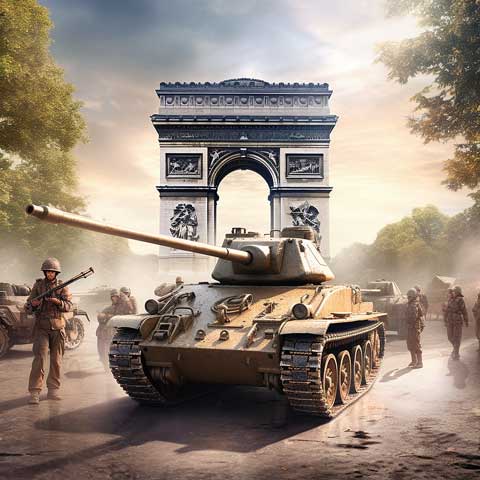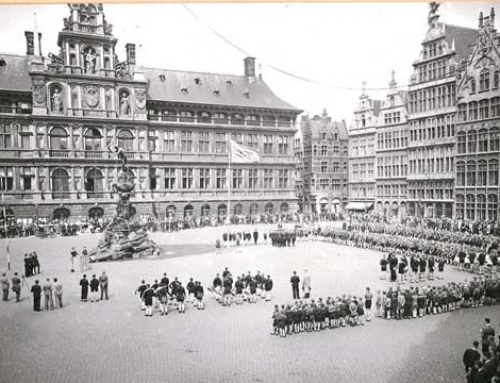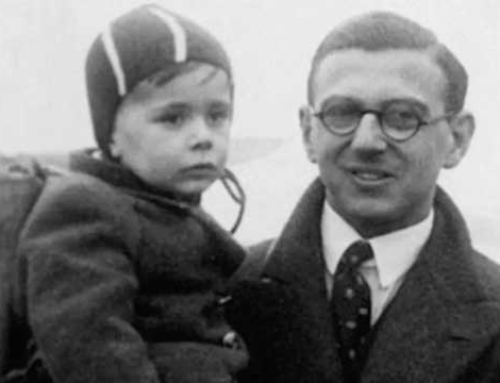Hello, dear reader. As you might recall from our previous articles – about the book overview, Hitler’s rise, the rise of the Nazis – we are delving together into “The Rise and Fall of the Third Reich.” Today, we continue with the next chapter: the Blitzkrieg and the domination of Europe. Brace yourself for a fascinating journey through time!
Blitzkrieg: A Revolutionary Military Strategy
Blitzkrieg, literally translated as “lightning war,” was a revolutionary military strategy that the Nazis developed and perfected in the 1930s and 1940s. The idea behind this tactic was simple but effective: instead of getting bogged down in prolonged sieges or exhausting trench warfare, as during World War I, the Nazis would surprise their enemies with a combination of speed, surprise, and brute force.
At the heart of the Blitzkrieg strategy was a coordinated attack using various weapon systems. Tanks, providing armor and firepower, were supported by aircraft performing both reconnaissance and bombing missions. Additionally, motorized infantry provided the necessary flexibility and speed on the battlefield. This combined approach allowed for quick breaches of enemy lines, often causing the defense to panic. The result was rapid progress and territory conquest, leaving adversaries little time to organize an effective counterattack. It was a radical shift in warfare, changing how armies worldwide viewed modern combat.
The Fall of France: A Shock for Europe
Perhaps the most astonishing and shocking moment of the Blitzkrieg was the fall of France in 1940. Although France had a strong and respected army and defensive lines like the famous Maginot Line, it was unprepared for the speed and brutality of the German attack. In just six weeks, a period that still astonishes historians and military experts, the German army managed to breach French defenses, bring the proud French army to its knees, and occupy the City of Lights, Paris.
Winston Churchill, then Prime Minister of Great Britain, was deeply shocked by this event. He stated:
“The fall of France was the hardest blow ever suffered by the British Empire.”
This statement not only underscores the importance of France as an ally but also the sudden and unexpected shift in Europe’s power balance. With France under his control, Hitler now had unprecedented power over the European continent, allowing him to turn his attention to other regions and countries, including Great Britain itself. It was a dark and uncertain time for Europe, with the shadow of Nazism spreading rapidly and the continent’s future at stake.
The United Kingdom: Facing the Storm Alone
With the fall of France in 1940, the United Kingdom found itself in a precarious position. As the last major bastion of resistance against Nazism in Western Europe, the UK now stood alone on the front line facing the imminent threat of a German invasion. The English coasts were clearly visible from occupied France, and for many, it was a question of “when” and not “if” the Nazis would attack.
The Battle of Britain that followed was not just an aerial war. It was an epic confrontation between the Royal Air Force (RAF) and the German Luftwaffe. Day after day, pilots battled in the skies, while civilians took shelter from bombings below. But this battle was more than just a fight for air supremacy. It was a struggle for Europe’s future, a battle between two radically different worldviews.
Churchill, with his characteristic flair for rhetoric, summarized the heroism of the RAF pilots, saying:
“Never in the field of human conflict was so much owed by so many to so few.”
These pilots, often no older than twenty, faced overwhelming odds and defended their homeland with determination and courage that would help change the course of the war.
Despite constant bombings, city destruction, and the pressure of a potential invasion, Britain held firm. The determination and resilience of the British people, combined with the skill and bravery of the RAF, ensured that Hitler’s plans for a UK invasion were put on hold. This period, during which Britain stood firm against the Nazi threat, laid the groundwork for later Allied counterattacks and Europe’s eventual liberation.
Daily Life in the United Kingdom: Between Hope and Fear
In these turbulent times, daily life in the UK was far from normal. The constant threat of air raids created a tense atmosphere. Anti-aircraft guns and searchlights were set up throughout the country to detect and repel German bombers. People were encouraged to build shelters in their gardens or use public refuges during air raids.
The “blackout” was strictly enforced to prevent cities from being visible at night to enemy aircraft. This meant that all lights had to be dimmed or covered, and windows blacked out to prevent light leakage. While necessary, these measures made daily life difficult and sometimes dangerous, with people tripping in the dark or accidents due to the lack of street lighting.
Despite these challenges, the British people showed remarkable resilience and community spirit. A feeling of “all in the same boat” developed, and people helped each other as best they could. Volunteers, including many women, joined the Home Guard, assisted firefighters, or served as air defense observers. Children were evacuated from major cities to safer areas in the countryside to protect them from bombings.
This period of uncertainty and hardship, but also of community and determination, shaped the character of an entire generation of Britons. It was a time when the country showed its true strength and determination, despite overwhelming odds.
Learning from the Past
It’s astonishing how quickly the fate of nations can change due to decisions, strategies, and sometimes pure chance. The Blitzkrieg and the events that followed remind us of the importance of staying vigilant in the face of threats and challenges. In our current world, full of complex geopolitical tensions, we can learn much from the mistakes and triumphs of the past.
Keep following us, as in our upcoming articles, we will delve deeper into this fascinating topic and explore more events of World War II. Until next time!






